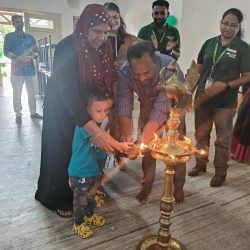Dr Michael Minton reports on IAPCON 2015, Hyderabad
 Most of the palliative care pioneers of the 1990s in India have been fortunate to be taught by Dr Michael Minton, when he was a member of the faculty of WHO Collaborating Centre for Palliative Care at Sir Michael Sobell House, Oxford.
Most of the palliative care pioneers of the 1990s in India have been fortunate to be taught by Dr Michael Minton, when he was a member of the faculty of WHO Collaborating Centre for Palliative Care at Sir Michael Sobell House, Oxford.
He continues to visit India and mentor us. Please see his brief report on the recent annual conference of IAPC at Hyderabad. Thank you Michael, for this report and for all that you have done for our people. We look forward to your continued support and to your blessings.
The success of the 22nd IAPCON Hyderabad was highlighted in the March newsletter. I would like to add a few personal observations which reflect the increasing development and sophistication of Indian palliative care.
The growth of community projects beyond Kerala was illustrated by Dr S Bora (Kolkata) reporting on the recent West Bengal community programme, where they have trained a 1000 volunteers in 10 Panchayats and had seen 169 patients by September 2014. Other community projects reported the value of electronic equipment. One is using tablets for keeping and sharing patients records, and another using skype and email to obtain expert advice for their patients.
The 1st prize in the oral presentations was awarded to Dr P Seshachar (Bangalore) who reported her experiences with an innovative shaped feeding spoon for patients with swallowing difficulties.
The winning poster by Dr C Singh (Kochi) reported the successful outcomes of an integrated working relationship between the palliative care and the intensive care teams who regularly met to discuss patients and family issues. This critical topic of needing to recognise when a person is dying and the futility of pursuing further treatment has led to the writing of valuable guidelines, a collaboration between the Indian Society of Critical Care medicine and the IAPC ( ref:Myatra SN IJCCM 2014;18:615-35). The guidelines need to be widely circulated and also could be a model for other countries.
The conference had international delegates and speakers who gave progress reports from neighbouring countries Bangladesh, Nepal, Sri Lanka, Thailand and the United Arab Emirates, all of which had had influence from India.
There was also recognition of the achievements in 2014 . The amendment of the Indian Narcotics law to allow the medical prescribing of opioids and the World Health Assembly statement on the need to integrate Palliative Care (PC )into health care systems. These achievements have involved Indian PC workers who continue to advise the Indian government and the WHO on PC policy. It is an exciting and expanding time for PC and the conference fully achieved its aims.




